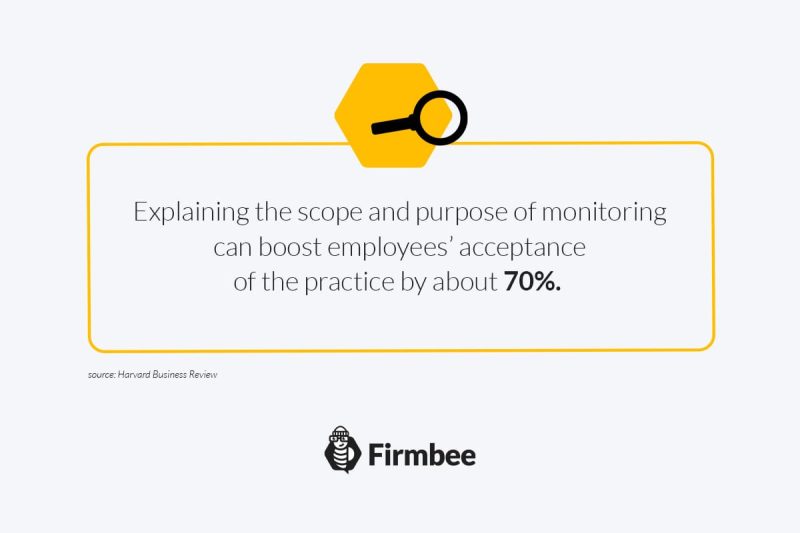Does spying on employees ethical for HR departments? HR departments in modern organizations are permanently assigned to the organizational structure. Human resources – HR management aims to develop the right balance between the expectations of management and employees. The work of the HR department is mainly based on the formation of appropriate human resources policies in terms of recruitment, motivation and professional development.
No less important is the control over employee-related matters and interpersonal contacts. On the one hand, the HR specialist must properly encourage staff to work and develop more effectively, and on the other hand, meet the goals set by the employer. Maintaining the right balance is a difficult challenge, which is why HR departments are increasingly turning to rather controversial means of control, such as tracking computers through spyware or installing cameras.
Spying on employees – table of contents:
- Ethics in HR
- Spying on employees, is it legal?
- Methods for tracking employees
- Spying on employees – summary
Ethics in HR
We often hear about business ethics. But are HR ethics the same thing? Probably not necessary, business ethics is a much broader concept and includes technical, environmental and pro-social aspects. HR ethics, on the other hand, focuses only on interpersonal relations within the organization and oscillates around a code of ethical conduct. The most important recommendations for ethics in HR management concern how to address and appropriately interview candidates and employees, how to treat all employees equally, how to keep confidential information (often employees’ personal affairs), and how to operate the employee evaluation system and incentive tools fairly and transparently.
HR ethics is more than a set of norms and rules. It is a responsibility for proper interpersonal relations and organization-wide communication. The HR department should uphold ethics, and in the event of irregularities in this regard, immediately take appropriate corrective and remedial action. Is pro-ethics propaganda beneficial to the organization, and is it worth the challenge? An ethical work environment increases the value of the company in the long term and raises its level of competitiveness in the market, reduces costs and maximizes profits. It positively affects the company’s image, and strengthens employee loyalty, thereby reducing the level of staff turnover.
Spying on employees, is it legal?
Every organization has control systems to monitoring work of its employees. How it implements the control activities depends mainly on the organizational culture and personnel policy model. The development of modern technology and electronic means of communication is a big incentive for employers to meticulously monitor the work of their staff.
Spyware programs installed on company computers make it possible to see what sites an employee accessed and how much time he spent doing so, what social messengers he used, and where and what messages he sent. These programs also make it possible to view mailboxes and read the correspondence in them. Cameras are also installed for monitoring and surveillance, recording the work at the workstations in question. And in the case of company cars, GPS modules are installed in them, which indicate the route and time of movement of the vehicles.
The question arises, is this kind of surveillance in the work environment legal? Of course, the legalities of this issue vary from country to country. In the UK, for example, employers are allowed to use technologies that record the work of staff. The condition is that employees are warned about these activities and that there is a separation between working time and leisure time. The employer must not violate the privacy of employees.
In some eastern European countries, the boundary between permitted and unlawful monitoring of employees is not directly regulated by law. An employer wishing to take steps to record employees and their activities should obtain permission from them to use such control measures and, in addition, state the purpose of such action. The situation is similar in Germany with the exception that the installation of cameras is done in a more restrictive manner, supported by irrefutable arguments. In addition, audio recording is prohibited. Violation of the confidentiality of conversations carries a prison sentence of up to three years.
Methods for tracking employees
HR departments often use technical devices as part of job control, to check the efficiency of tasks performed, quality and results. Control activities can be carried out in various ways using a variety of tools such as:
- Installing cameras in the workplace. To play back the image in real-time or record and store it.
- Recording calls and analyzing phone records. The employer owns the phone, which should be used only for business purposes. Therefore, it can monitor its use through billing analysis.
- E-mail monitoring, control of Internet activity. In this case, the situation is analogous. The employer, as the owner of the computer, can install spyware on it to prevent the sharing of confidential information with unauthorized persons.
- Installing GPS devices in company cars, to control the route and travel time. This most often involves sales representatives and professional drivers.
- Fingerprint or iris scanning. These are biometric data classified as sensitive. The employer’s use of this type of data for monitoring must be particularly justified.
Monitoring activities can be either continuous (preventive) or intervention and ad hoc. However, HR managers should realize that overstepping their authority in this regard involves civil liability. To avoid these consequences, the types of monitoring used, the rules of implementation and the persons responsible for these activities should be specified in detail in the internal regulations.

Spying on employees – summary
The legal context of spying on employees has already been presented. However, are such actions consistent with the ethics of the work environment? The answer to this question is self-explanatory. If the reasons for monitoring work are transparently and justifiably presented, the employees are made familiar with them and the intentions of such a scope of control are explained, then such actions are in line with professional ethics in general. On the other hand, if the company monitors covertly, without informing the employees, then such conduct is not only contrary to ethics but also and above all illegal.
Read also: 7 benefits of personal audit and how to perform it
If you like our content, join our busy bees community on Facebook, Twitter, LinkedIn, Instagram, YouTube, Pinterest.
Author: Nicole Mankin
HR manager with an excellent ability to build a positive atmosphere and create a valuable environment for employees. She loves to see the potential of talented people and mobilize them to develop.


















